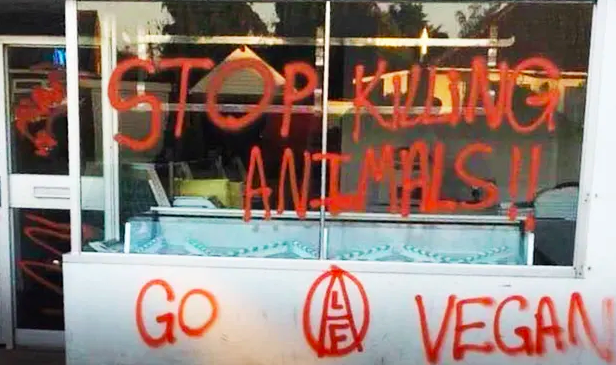The need for activism, and good activists has become progressively more apparent in relatively recent times. In a world ravaged with various political and social issues that are often denied real attention from those in charge, consistent effort from the public to promote and intervene in such issues is becoming increasingly important.
While the exact role of an activist can be quite convoluted, and each individual may perform acts of activism at various degrees, simply put, an activist serves to ignite change. This could exist in the form of lobbying, campaigning, protesting, or boycotting – amongst many other forms and for many different issues. From LGBT+ rights and animal cruelty, to #BlackLivesMatter and climate change, activists worldwide set out to stand up for a good cause and rally to promote new ideas.
But what happens when it is taken too far?

In late 2018, requests from multiple French butchers arose for police protection against animal rights activists following a series of harassment complaints and vandalism. These requests against said protesters garnered media attention world-wide, breaking at a time when highly publicised incidents of anti-meat vandalism and protests were also occurring within Australia – the most famous likely being vegan activist group ‘DxE: Direct Action Everywhere’ – storming a Melbourne Steakhouse with graphic posters of cows in slaughterhouses and audio recordings of animals being killed for food. Incidences like this left those both within and outside the vegan community conflicted regarding whether this type of activism is acceptable, despite the group having a positive message to spread, and a good cause to back.
But vegans and animal rights activists aren’t the only activism groups under fire for provocative and over-the-top methods of garnering attention. Often portrayed in an equally unflattering light are feminist activists, most of whom fight for an extremely worthy cause, however some in perhaps inefficient ways. While some prejudices against feminists come from years of deep rooted misogyny, others may stem from witnessing the actions of those who have simply missed the point.
Radical feminism – that is, the call for a reordering of society in which any male supremacy is eradicated in all social and economic contexts – is often the image that people conjure when hearing the word “feminist”; the concept having increasingly overpowered the peaceful, realistic intentions of what feminism stands for – equal rights for men and women. While many have dismissed women’s rights activists as overly sensitive and crazy for this reason, it was conservative American radio talk show host Rush Limbaugh who coined the phrase “feminazi”, an offensive title now also closely associated with the concept of feminism as a whole, yet one that is deemed by many as a fair judgement.

What is perhaps not realised by those participating in this type of intense activism is the detrimental effect it may have on the issue they seek to promote. Often labelled as “extremists” and shunned by other participants of whom rally for the same cause, these over-the-top activists may approach the battle of said issue in a manner that prevents outsiders from sharing their support. In these instances, a general ideology is maintained wherein these extremists see their own views as being the only acceptable ideal to follow, with no opportunity for debate or criticism from those who potentially disagree.
It’s easy to dismiss this approach, but for some it is believed that this is a necessary way to fight for change.
Incidences such as animal rights activist taking their war against the meat industry into the hospitality sector may give the group a bad rap, but it does ignite conversation. PR Officer of the Vegan Society Dominika Piasecka believes that these extremist groups don’t understand how damaging these acts can be to their shared cause, however that isn’t quite true. Members of DxE have previously stated their realisation that their methods may be unpopular, but affirmed their belief that protests should involve some sort of disruption to the status quo, and therefore feel confident that they are making a positive impact. And perhaps they’re right! Veganism is definitely on the rise, with more vegan and vegetarian-friendly options being rolled out on menus worldwide, and more people opting for the plant-based diet.

On top of this, despite the ever-growing popularity of disassociating with the term “feminist”, studies have shown that record numbers of both men and women do still support women’s rights and gender equality, notions of which encapsulate the entire point of feminism as a whole. This unwillingness to identify oneself as a supporter of this cause is ultimately a reflection of the negative connotations now associated with the word, but it has no doubt open up a ton of conversation.
Therefore, it is unclear as to whether or not this kind of activism does more good than damage – but there is no denying it does something, even if that something is just offering an opportunity for discussion. While these intense activism groups definitely have a good message to sell, it may ultimately take testing of various methods to find the best way to sell it.

